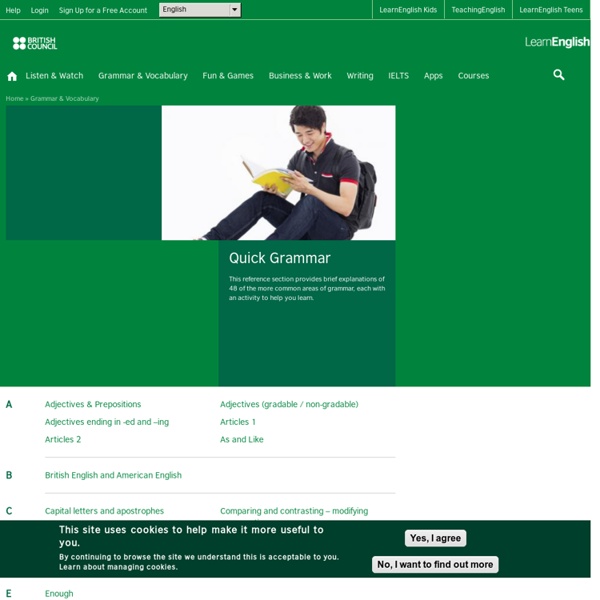



http://learnenglish.britishcouncil.org/en/quick-grammar
Related: Grammar • grammarEnglish Grammar Tenses: Stories, Exercises and Answers Welcome to the English Grammar Tenses – The Ultimate Resource! One of the easiest ways to teach and learn grammar is through stories. Click Here for Step-by-Step Rules, Stories and Exercises to Practice All English Tenses Games Crossword GameJust like an old-fashioned word search! Using the mouse and the wordlist, find and highlight the hidden English words in the box! As the levels get harder, the words start appearing in different orientations. But hurry, the clock is running!Cumulus ConfectionHigh on Mt Olympus, the Greek gods are planning their annual carnival. English grammar: A complete guide Do you have a question about the correct usage of the semi-colon or how to place relative adverbs in a sentence? If so, you've come to the right place! The edufind.com English grammar guide is a complete reference on the rules of English usage. Every grammatical rule is explained in clear, simple language with several examples and, when necessary, counter-examples.
The best game ever! (How to increase student talking time) One of the rewards of teaching a class of 16 talented, motivated 12-year-olds is that you feel that almost every activity turns into something really valuable. Not that you don’t feel the same will other classes, it’s just that with young learners it’s somehow more tangible. Today, a classic game-like activity – originally meant to be just a warm-up to start the class – changed itself into a complex, meaningful and authentic lesson. I deliberately said ‘changed itself’, but I should probably say ‘the students changed it so’.
The Best Sites For Grammar Practice I haven’t been a real big fan of putting a lot of time into direct grammar instruction. I generally believe, and I know some research has shown, that students can develop grammar skills through reading, and prioritize helping my students find high-interest reading materials. In addition, I use concept attainment (see posts near the bottom of The Best Resources About Inductive Learning & Teaching) to help students learn grammar concepts inductively. Planning a grammar lesson By teaching grammar we not only give our students the means to express themselves, but we also fulfil their expectations of what learning a foreign language involves. Fortunately, nowadays with the emphasis on a communicative approach and a wealth of stimulating resources, teaching grammar does not necessarily mean endless conjugation of verbs or grammar translation. Which approach?
Grammar A-Z Some grammatical terms may be familiar to you, but others can be confusing or hard to remember. Clicking on any term below will give you a quick and clear definition. Below the categorized section you’ll find all the terms listed from A–Z, so you can browse that way if you prefer. abstract noun Vocabulary and autonomy The general aim is to involve the students in a more autonomous fashion in their learning, rather than simply having them presented with word lists selected by the teacher or syllabus. The role of vocabulary teachingHow can teachers help their learners?Self-initiated independent learningFormal practiceFunctional practiceMemorizingBest approachPractical activitiesReferences The role of vocabulary teachingIn the context of learning English as a foreign language, a learner is forced to be autonomous and independent and make conscious effort to learn vocabulary outside the classroom simply because the exposure to the target language is limited in class. So teachers cannot rely on their Ss 'picking up' lexical items.
Future I Simple going to Exercises on Future I Simple with going to Going to future expresses a conclusion regarding the immediate future or an action in the near future that has already been planned or prepared. Form of going to Future Use of going to Future an action in the near future that has already been planned or prepared example: I am going to study harder next year.
Who or Whom? It’s Not As Hard As You Think Whom should be used to refer to the object of a verb or preposition. When in doubt, try this simple trick: If you can replace the word with “he”’ or “’she,” use who. If you can replace it with “him” or “her,” use whom. Differences in American and British English grammar - article By Kerry Maxwell and Lindsay Clandfield An article by Kerry Maxwell and Lindsay Clandfield on recognizing grammatical differences between American and British English. Introduction